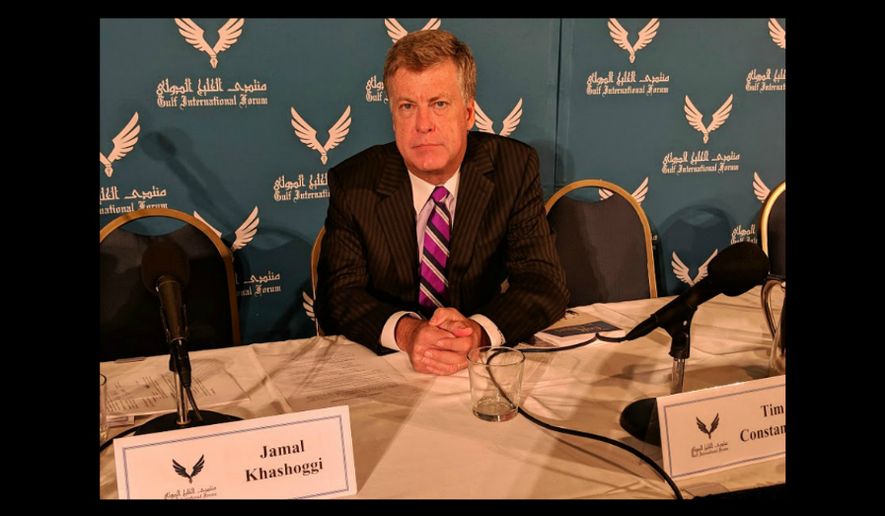OPINION:
A couple of months ago, I was invited to participate in the inaugural annual Gulf International Conference hosted by the Gulf International Forum, a Washington-based Middle East think tank. It was to be an all-day event with former ambassadors, international scholars and high-profile members of the media sharing their perspectives on a variety of topics relating to the Arab world.
While it was an honor to be invited to speak, there was nothing unusual about the request. By the nature of my work and background I am invited to any number of events with some regularity. This one was originally planned for September, but due to some scheduling conflicts was delayed until Oct. 16. As it turned out, the change of date would have a far larger impact on the event than any of us could have imagined.
On Oct. 2, Saudi dissident and Washington Post contributor Jamal Khashoggi walked into the Saudi Arabia consulate in Turkey. He never walked out. According to reports coming from the Turkish government and various intelligence sources, Mr. Khashoggi was detained against his will, interrogated and ultimately killed. That neat little sentence doesn’t do his violent end justice, so I’ll share with you more graphic details that have been reported.
The conservative Turkish newspaper Yeni Safak says it has heard audio recordings of Mr. Khashoggi’s gruesome fate. According to its reporting, he was dragged from the Saudi consulate’s office and strapped to a table in an adjoining room, screaming the entire time. He was told that if he wanted to live when he was taken to Saudi Arabia he would be quiet. He was not quiet. As Mr. Khashoggi continued to struggle, he was injected with an unknown substance and he finally quieted down.
The English language website Middle East Eye quotes a source that says Saudi forensic physician Dr. Salah Muhammed Al-Tubaigy then began to literally cut Mr. Khashoggi into pieces. First he cut fingers off. Then limbs. Ultimately he decapitated Mr. Khashoggi — all the while listening to music through headphones and encouraging others present to do the same. The images described are horrifying. It’s difficult to grasp one human literally cutting another living human to pieces.
But apparently that is what happened, according to the reports. We are told it was because Saudi Arabia, specifically Crown Prince Mohammed bin Salman, didn’t like the criticism Mr. Khashoggi leveled at him and at the Saudi government via the Washington Post and elsewhere.
What does this have to do with my invitation to speak at the Gulf International Conference? The panel I was asked to speak at was called “Free Media & Expression: Suppressed or Triumphant?” The discussion was intended to talk about the challenges faced by media around the globe, whether that be the blistering criticism by President Trump or more lethal dangers faced by journalists around the globe. Among those scheduled to sit on the panel with me were Al Jazeera Washington Bureau Chief Abderrahim Foukara and, yes, Mr. Khashoggi.
The irony of Mr. Khashoggi being scheduled to sit on a panel about suppression of free media and then disappearing in what appears to be the most gruesome manner possible at the hands of a Middle Eastern government is thick. The empty chair sitting beside me at the forum was haunting.
A robust discussion with an audience of hundreds, many of them journalists themselves, ensued. Some blamed Mr. Trump for the lack of civility around the globe, as though journalist killings just began to occur in the last 24 months. Others talked about the responsibility of media to get the story right, despite a dismal track record in recent years of reporting without verifying, even by the largest news organizations (CNN, ABC, NBC, Time). There were cheers from the audience. There were moans of disapproval at times.
But the loudest voice in the room was from the empty chair.
If Saudi Arabia were concerned about the criticisms by Mr. Khashoggi, they severely miscalculated in organizing a mob-style hit on him. If I had asked in September who Mr. Khashoggi was, most would have had no idea. This week he has been the most Googled person on the planet.
And the story isn’t going away. Journalists around the globe are outraged. They are scared. They want justice.
There was genuine concern at the Gulf International Conference that the Trump administration would not take Mr. Khashoggi’s disappearance and apparent death seriously. The worry was that Team Trump is so close with the Saudi royal family that he may look the other way.
Let’s hope not. In America our brains are hard-wired from birth to believe in freedom of speech and freedom of the press. Even when our president and CNN trade childish insults, no one thinks CNN or its personnel are in danger of being banished from the White House, let alone detained or killed. Unfortunately in much of the globe, the same can’t be said.
Mr. Trump has an opportunity to set world expectations from this point forward. He has a chance, assuming the evidence leads to solid confirmation of the Saudi role in Mr. Khashoggi’s death, to let the world know this will not be tolerated. Ever. Even if punishing the Saudis causes economic discomfort, the president has a responsibility to lead all nations in recognizing the value of human life and respecting free and honest reporting.
If an empty chair could dominate one panel discussion, surely our president can find the voice to lead on this basic human right.




Please read our comment policy before commenting.